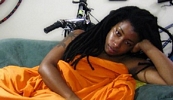I do a lot of research on articles I write, but this subject is one that hits very close to home. As I mentioned in my main article, RLS, unfortunately, can be inherited. While I have
not made a survey of all of my relatives, I know that I am joined in this condition with my younger brother and a son. So in researching this subject I definitely found out a number of things, what I didn't care for is the uncertainty as to why it happens.
So If you have Restless Leg Syndrome (RLS) then I don't have to explain what it feels like and the problems sleeping at night because of this 'unnerving ' condition. For those that feel they are 'coming-down' with this problem, I'm sorry, but here is some additional information that may help you or at least make you more aware of this condition.
You may have RLS if you can relate to even a few of the symptoms:
>When you are sitting or lying down, do have an undesirable urge to move your legs?
>Is this urge nearly impossible to ignore?
>Does your husband or wife ever complain about you keeping them up at night, because you are constantly jerking your leg in erratic movements?
>Have you ever found your leg bouncing up and down, almost on its own?
There are several major symptoms that accompany restless leg syndrome. The most notable of which is the time during which it tends to occur. Most of the symptoms are felt during the evening hours, particularly as one is lying in bed getting ready to go to sleep. It can also strike during extended periods of inactivity during which one is sitting or laying down.
Because RLS occurs when a person is relaxing or trying to go to sleep, they have a problem getting the rest that is needed for them. Insomnia may develop because of the periodic
development of limb movements (involuntary twitching and kicking of the legs) while asleep. Generally, the person is unaware of this, but anybody sharing the bed with them may have
their sleep interrupted as well.
While research into the causes of restless leg syndrome is ongoing at this time there is no specific known cause. There is conjecture that a neurological disorder or chemical imbalance in the brain, notably the chemical dopamine, is responsible for the symptoms of RLS. Dopamine is responsible for the nerve impulses that control muscle movement. Not
only that there is no known method of preventing RLS at this time.
To top it all off, there is even a controversy in the medical profession! Many doctors express the view that the incidence of restless leg syndrome is exaggerated by manufacturers of drugs used to treat it. (They obviously don't have RLS, otherwise I doubt they would make such a statement.) Others believe it is an under-recognized and under-treated disorder - GOOD FOR THEM.



